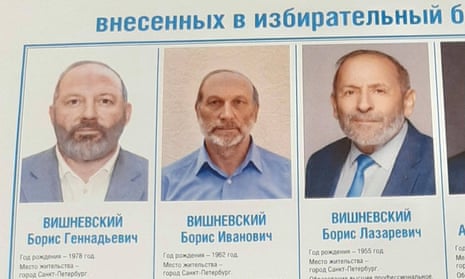Russian opposition politicians are used to finding spoiler candidates with identical surnames running against them in order to confuse voters at the polls. Now it appears that the impersonators are changing their faces as well.
That’s what Boris Vishnevsky, a senior member of the liberal Yabloko party, is facing in his district in St Petersburg before municipal elections later this month.
Vishnevsky already knew that two of his opponents had changed their names so that they were also called Boris Vishnevsky, an update on the common tactic of nominating a “double” to split the vote and deliver victory to another candidate.
But when a district voting poster was revealed on Sunday, it showed something far more shocking: three nearly indistinguishable Boris Vishnevskys, all balding, greying, and sporting matching goatees. As a Facebook friend of Vishnevsky’s pointed out, the simplest way to spot the real Vishnevsky is that he was the only one who bothered to wear a tie.
“This is all done to disorient voters, so that they confuse the fake with the real, and instead of the real Vishnevsky they vote for one of the fakes,” said the real Vishnevsky in an interview. The fake, or at least newer, Vishnevskys could not immediately be reached for comment.
Vishnevsky’s opponents had grown their beards and moustaches for the photographs and may have also submitted photoshopped images to the electoral commission, Vishnevsky said. It also appears that at least one of the candidates had either shaved his head or digitally altered his hairline for the photograph.
“I have never seen anything like it,” said Vishnevsky. Earlier, he called the “doppelgänger” tactics “political fraud”.
At least one of Vishnevsky’s opponents, who until recently was named Viktor Bykov, is believed to have changed his appearance considerably for the photographs. In an official photograph used on a St Petersburg government website, Bykov had a full head of hair and looked years younger than the photograph submitted to the electoral commission.
Bykov’s identity was first revealed by the Russian newspaper Novaya Gazeta, and a St Petersburg news website later published a screenshot of a document it alleged showed he changed his name on 3 July. The election’s poster, published by Vishnevsky, confirms that one of his opponents was previously named Viktor Bykov.
Less is known about the other opponent, who was previously named Alexei Shmelev and was reported to be a sales manager at a St Petersburg company. Neither of Vishnevsky’s opponents have campaigned publicly or had any public appearances. Until this week, it was unclear how they even looked, and it still is not entirely clear.
Vishnevsky said he didn’t know the men’s motivations in running against him but said: “I don’t think they agreed to embarrass themselves like this for free.”
“Double” candidates regularly pop up during Russia’s election cycles, which can be surprisingly cut-throat despite the expectation that the ruling United Russia party will maintain a majority in the Duma. The rising tide of opposition to United Russia and growing support for the Communist KPRF have apparently spooked the government and nominating doppelgängers can siphon off precious votes in close contests.
The news outlet Meduza last week reported that doppelgänger candidates for the Duma were running in at least three Moscow districts, mostly against communists with strong chances at the polls.
But the campaign against Vishnevsky stands out because his opponents legally changed their names (although the candidates still have different patronymics – middle names that are usually assigned to Russian children according to the name of one’s father), because there are two doubles rather than just one, and, of course, because the men had engaged in political cosplay to derail the vote.
“Every time there are elections we say these are the dirtiest elections there have ever been,” said Vishnevsky, when asked about how this campaign compared to the past. “I’m sure we’ll say the same at the next elections, too.”
